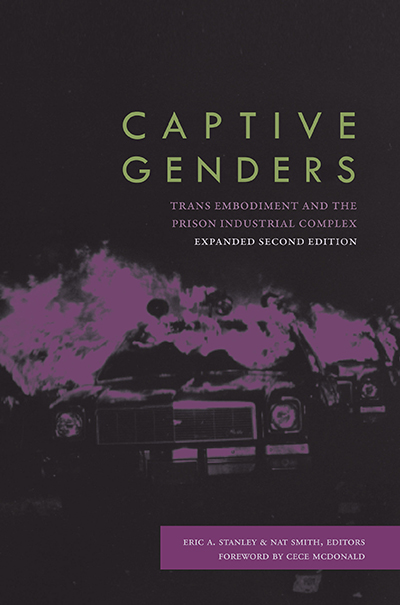Did you know that Truthout is a nonprofit and independently funded by readers like you? If you value what we do, please support our work with a donation.
My home – or, at least my place of residence for the time being – is the US Disciplinary Barracks, the United States’ crown jewel military prison. Being both a military institution and a prison, it lies in a unique, though not necessarily uncommon, intersection of two of the world’s largest institutional ecosystems: the military-industrial complex and the prison industrial complex.
My status as a trans woman in a military prison places me in the unique position in which the extraordinary administration, regulation, surveillance and policing of gender norms, expectations, vices and virtues clash with my most fundamental understanding of my identity and how I intend to express myself as a female. For instance, although I am now being allowed to wear female undergarments, use cosmetics and take hormones, I am not allowed to grow my hair beyond the two inches authorized by the military.
The purpose and intent of the military-industrial and prison industrial complexes are very similar. While both systems often appear to be functioning separately, there are more and more instances where they operate in unison. This is especially the case in our post-9/11 world, in which these frameworks and structures overlap and operate together in many places. Such overlaps between them can now determine how individuals and groups that society labels as “criminal” can now be labeled as enemies or terrorists and become classified as threats to national security.
Both systems impact women and other gender and sexual minorities – the imposition of strict gender norms of femininity on women, and the praise of masculinity and the macho at the expense of femininity, which is deemed a signed of “weakness.” Both systems impact immigrants through the criminalization of those who are read as “unfamiliar.” The military-industrial complex also targets people read as “foreigners” by labeling them as potential terrorists and threats to national security. Both systems impact people living in poverty through the criminalization of low-income people.
It is at the intersection of these two systems that trans women such as me are placed into the exhausting and dehumanizing position of being determined as a potential criminal, named as a threat to national security and deemed as immutably male.
When I was a homeless teenager in 2006, trying to survive in the Midwest and on the streets of Chicago, I was left to fend for myself against both systems. The prison industrial complex had the power to imprison me and label me as an offender for life, for crimes as small and victimless as loitering in public areas, trespassing in private parking areas and being suspected of solicitation for prostitution. The reality, from my perspective, was clear: that I had nowhere not to loiter or trespass, and that my perceived sexual orientation, living as an effeminate gay male at the time, allowed law enforcement officials to assume that I was a prostitute.
Later, in 2007, when I attempted to start a career and obtain a degree from college, the military-industrial complex tempted me with large bonuses and financial assistance. By enlisting for a four-year term as an intelligence analyst, I would also receive training with certification and tuition assistance, and receive more pay – without paying for taxes – for deploying to Iraq or Afghanistan. Yet, despite my certain sexual orientation and uncertain gender identity, I placed myself into a structure of strict sexual and gender norms and expectations, compounded by the “don’t ask, don’t tell” law still in effect.
 (Image: AL Press)In the 2009-10 timeframe, when I eventually did deploy to Iraq, I saw firsthand how the military places people like me and my fellow soldiers into some of the most burdensome positions in the intelligence community, with most of us making less than a fourth or a fifth of the pay earned by civilian counterparts while enduring long work days with no time off.
(Image: AL Press)In the 2009-10 timeframe, when I eventually did deploy to Iraq, I saw firsthand how the military places people like me and my fellow soldiers into some of the most burdensome positions in the intelligence community, with most of us making less than a fourth or a fifth of the pay earned by civilian counterparts while enduring long work days with no time off.
From the start of 2010 to our current moment (2015), l have continued to have my gender enforced and regulated (to varying degrees) as being forever and immutably male underneath the somewhat mild and cosmetic relaxations of the “male” standards imposed on military prisoners. And, this has been primarily the result of two years of public pressure and litigation to compel the military and the US secretary of defense to provide for accommodations as recommended by medical and mental health professionals and the World Professional Association for Transgender Health standards of care. Thus far successes have been slow and, ultimately, unnecessary.
How do we begin to roll back the widespread effects of these two (continually expanding) industrial complexes? One thing we can do is identify what the institutions are and who the interested parties behind them are. We can identify the scope and range of the institutions driving the industrial complexes. We can identify what the general objectives of the parties identified are, and what specific objectives each component to them has to meet the general objective.
Through educating each other and ourselves, we can fill in the gaps in our understanding of the world around us. We can inventory all the things that we know from our experience, and find out what we don’t know or understand. But, this is only the first step. From here, we can use our improved understanding of how each institution works to identify its weaknesses and vulnerabilities. These are going to be dependent upon the context in which the specific institution operates. For instance, a private corporation is going to have different vulnerabilities than a public department or agency does. We must also communicate with each other, sharing knowledge, experience, ideas and criticisms with each other. Through this kind of communication, which institutions naturally and reflexively attempt to stifle, we can help to minimize the scale and effect of the military and prison industrial complexes in our lives.
Note: This article is an adaptation of excerpts from “On the Intersection of the Military and the Prison Industrial Complex,” Chelsea Manning’s contribution to the new edition of Captive Genders: Trans Embodiment and the Prison Industrial Complex, which is available to order with a donation to Truthout..
A terrifying moment. We appeal for your support.
In the last weeks, we have witnessed an authoritarian assault on communities in Minnesota and across the nation.
The need for truthful, grassroots reporting is urgent at this cataclysmic historical moment. Yet, Trump-aligned billionaires and other allies have taken over many legacy media outlets — the culmination of a decades-long campaign to place control of the narrative into the hands of the political right.
We refuse to let Trump’s blatant propaganda machine go unchecked. Untethered to corporate ownership or advertisers, Truthout remains fearless in our reporting and our determination to use journalism as a tool for justice.
But we need your help just to fund our basic expenses. Over 80 percent of Truthout’s funding comes from small individual donations from our community of readers, and over a third of our total budget is supported by recurring monthly donors.
Truthout has launched a fundraiser, and we have a goal to add 280 new monthly donors in the next 72 hours. Whether you can make a small monthly donation or a larger one-time gift, Truthout only works with your support.
